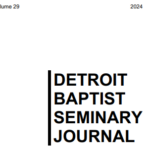Ora…et Labora
Summer comes to a more-or-less official end this weekend with the celebration of Labor Day. The day is not so much about general labor, of course, but about organized labor (an issue about which the Bible is mostly silent and, when it does speak to the issue, is a bit critical). Still, Labor Day offers a fine occasion to review the high place of work in God’s created order.
- The mandate to work is not (as some seem to believe) a result of the Fall, but rather the glory of man from his prelapsarian setting forward. Indeed, the command to work, together with the command to establish a family, comprise the whole of man’s civic responsibility detailed in the Dominion Mandate (Gen 1:28; 2:15). Nor will work end with Christ’s Second Coming, as the parade of the “glory and honor of nations” will continue throughout eternity (Rev 21:26). These points are significant, because by predating and postdating the Bible’s redemptive impulse, work emerges as a primary end of mankind and not merely as the means to some greater end (e.g., witness-bearing). We work firstly coram deo and only incidentally coram hominis (Col 3:22–24; Eph 6:6–8).
- It is in the ongoing fulfillment of this labor mandate, then, that men find their truest dignity as divine analogs. (I emphasize the male gender on this point, as Scripture seems to do, not because women cannot find satisfaction in working or are in any sense incomplete analogs of God, but because the Bible seems to locate the woman’s primary source of dignity in her role as a helper suitable to her husband while the man’s primary source of dignity in his work.) The dignity of work carries in itself its own reward, Solomon tells us over and again (see esp. Prov 12:14; Eccl 2:10, 24–25; 5:18), and is a legitimate source of true pride and satisfaction.
- God’s expectation of work from his creatures is quite emphatic, and his derision of sluggards in the Proverbs is nothing short of relentless. Perhaps most stunning, however, is the fact that Paul includes idleness on the very short list of vices specifically fingered as grounds for church discipline (2 Thess 3), asserting even that those who will not work should not eat, a sentence that, if carried to its logical end, is an effectively capital sentence (see here for a possible reason why Paul’s response is so aggressive).
- Of course the fact that the believer does his work firstly before God does not mean that a man’s reputation as a hard worker (or a poor one) cannot impact his witness-bearing. Since the Christian worldview is a holistic one, a believer’s commitment to his civic duties (including his industry) is a critical window into the strength of his faith—one that either adorns or discredits the Gospel (Matt 5:16; Titus 2:9–10). So our work can never be totally divorced from our evangel. The price of idleness is very high.
Much more could be said on the topic, of course, and no doubt we will see/hear a glut of similar reminders this weekend. And that’s a good thing in a day when the responsibility of “paying one’s way” is increasingly dismissed and laid on the backs of the “village.” Let us not succumb to this trend but rather find our dignity in working hard to become societal givers rather than societal takers (Eph 4:28; Gal 6:9–10) to the glory of God.



